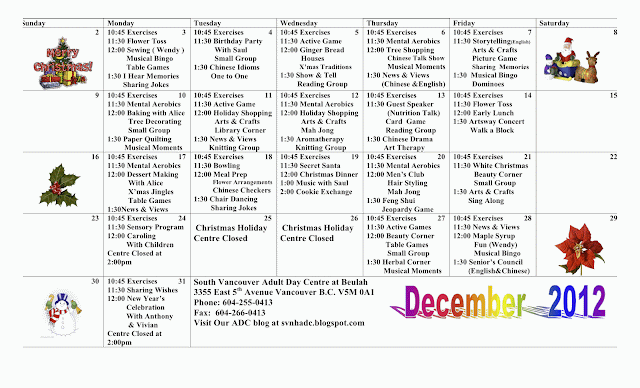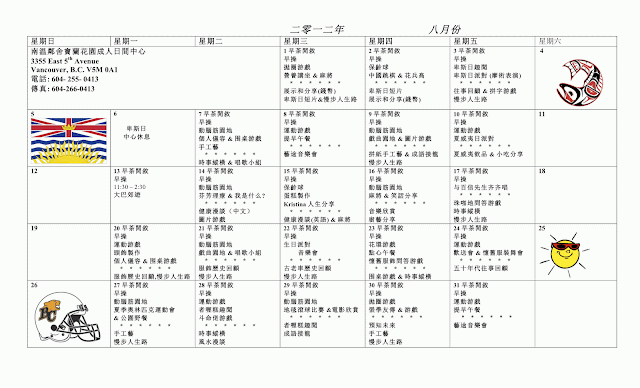In preparation for the holiday season, our staff has put together a list of gift ideas that you might consider for your loved one this year. We recognize that each person is unique in terms of their culture, background, interests and abilities, so we've included a variety of ideas. We also understand that caregivers may be looking for new ways to spend time with their care recipients, so have looked for activity-based gifts activities that can be enjoyed together and with other family members. Click on the highlighted words to be linked to the resources.
Magazine Subscriptions
Subscribe to a magazine on a favourite topic that can be enjoyed throughout the year. Reminisce Magazine is an excellent read and includes pictures, memories, stories and recipes from the past sent in by readers. You can also access free resources on their website that can be shared with your gift recipient.
Memory and Picture Albums
These albums can be created around a variety of themes, assembled together with your gift recipient and used as a discussion guide throughout the year. Themes may include childhood photos, favourite recipes, vegetables from the garden or vintage cars, which can easily be changed or updated. Include small descriptions of each picture and/or discussion questions so that the books can also be enjoyed with other visitors.
Exercise and Active Games
Many of our participants enjoy exercise
and active games and several complete exercise routines at home, as well. Of course, you will want to make sure that the exercises, equipment and activities that you choose are safe and have been cleared by your gift recipient's physician, but safe and moderate physical activities have great physical and emotional benefits for most people.
- Therabands, hand weights and/or leg weights can be used at home. This equipment can be purchased from any local sporting goods store, or ordered from companies, such as Going Strong by Flaghouse, that specialize in equipment that is adapted for people with varying physical needs and abilities.
- Adapted active games, such as magnetic darts, horseshoes and shuffleboard are available through companies, such as Spectrum Nasco.
- If your gift recipient is or was a dancer, they may enjoy Chair Dancing DVDs. We’ve tried Chair Dancing Around the World and have found that our participants who enjoy music and dancing respond positively to this DVD.
Quiet Activities
There are numerous adult appropriate products that have been
designed to engage those with a variety of interest and ability levels. Again,
there are many products available on the Concepts du Sablier and Spectrum Nasco websites, but here are some of our favourites:
- Adult themed puzzles with larger sized pieces.
- Art themed gifts, such as models or painting supplies, which can be purchased from any art supply store. These materials are adapted for a variety of ability levels, ranging from difficult to more simplified.
- Knitting or crocheting supplies. For those with previous experience, some new needles, yarn and your assistance may be welcome. For those who have no prior experience but are interested, we’ve had success with knitting looms.
Family Games
We find that reminiscing games are very popular with our participants and open up great discussions. Both Concepts du Sablier and Spectrum Nasco are good resources for identifying a game that may interest your gift recipient. We have had success with the following games:
- Shake Loose a Memory: We find that this reminiscing game is enjoyed by participants with a variety of ability levels since it stimulates memories, while at the same time including simple game elements, such as rolling a die and adding up points at the end.
- I Hear Memories: The whole family will enjoy listening to this CD of sounds and guessing what they are. A booklet including discussion topics for each sound is included to promote discussion.
- Life Stories game: We haven't tried this game yet, but thought it looked like a good one.
Music and Stories
Most people would be able to identify music or movies that their gift recipients may enjoy, however, we thought we would highlight a few of our favourites that you may not have considered in the past.
- The Purple Hairpin : Many of our participants enjoy Chinese Opera and recommend this DVD.
- Songs We Remember-Music without Musicians Series: Many of our participants enjoy singing songs from the past and we find that everyone benefits from having the words to sing along to.
- Amazing Grace: Five Hymns that Changed the World. This is a very enjoyable DVD that includes a dramatized story and history of five popular songs and hymns, including Silent Night.
- Audio CDs of favourites stories are a wonderful way to pass the time. Our recommendation for Christmas enjoyment are the short stories by Stuart McLean, Vinyl Cafe Christmas Collection
We hope that our suggestions have given you a few new ideas for gift giving this year.
Happy Holidays to everyone!
·
.jpg)










.gif)













